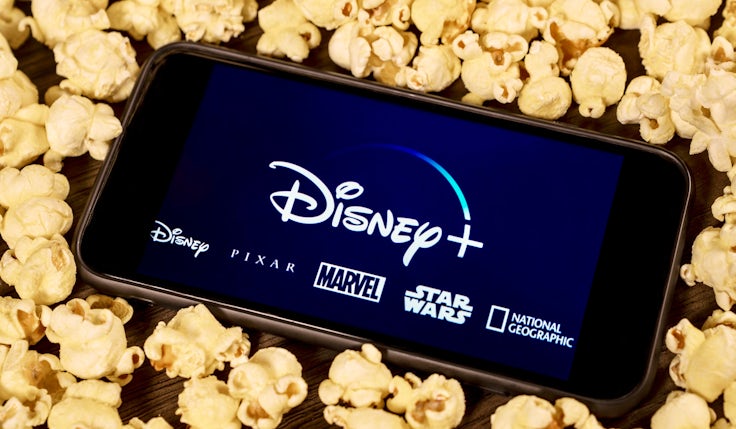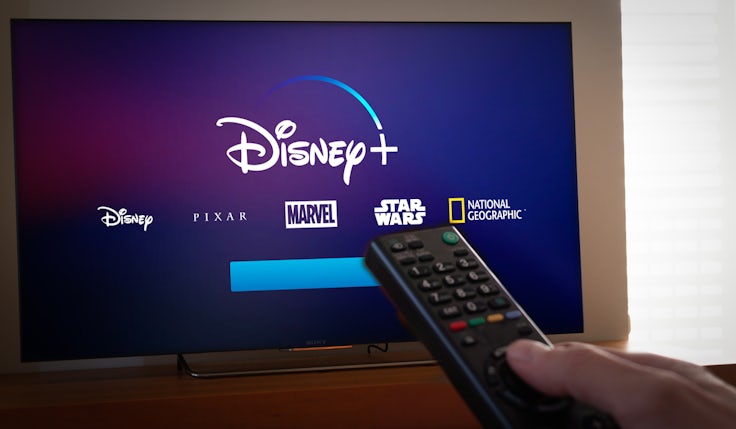Disney is playing a bigger game in its box office battle with Scarlett Johansson
Black Widow’s release on Disney+ alongside cinemas hit the film’s box office revenues, but what Disney wants is proximity to the consumer and the insight that comes with it.

The villain strikes the woman across the face with the back of his big, meaty hand. “This is not how I wanted this evening to go,” he tells her in Russian. She takes a breath and adjusts her position. That proves difficult because she is tied to a chair. And teetering on the edge of a 30ft drop.
“I know how you wanted this evening to go,” she replies in Russian. “Believe me, this is better.”
The villain shrugs and starts to explain his evil plan. He walks towards a gruesome collection of torture instruments as his exposition continues. Suddenly his phone rings and the voice on the end of the line calmly tells him to pass the device to the woman in the chair. The villain haltingly complies and the woman is ordered to immediately return to base.
“Are you kidding?” she asks. “I’m working. This moron,” the damsel continues, gesturing her head towards the now thoroughly bemused villain, “is giving me everything.”
Wonder Woman 1984’s release could determine the future of cinema
Orders are, however, orders. She nudges the phone back to the villain and proceeds to take him and his two henchmen out in a matter of seconds. Only then does she extricate herself from the chair, collect her black stilettos and head back to base.
It’s one of Black Widow’s most famous scenes and typical of the Marvel hero’s MO. She plays the ignorant or innocent victim for long enough to assess the situation and gain the all-important intel. Then, and only then, does she break out from her – apparently – helpless cover, and make the required moves to take control of the situation and turn the tables on her unexpecting adversary. The helpless Russian villain in the scene above from Avengers is merely the latest in a long line of suckers that has included Loki, Iron Man and, now, Walt Disney.
If you sell direct to the consumer you can now adjust and experiment the manner in which you market your products.
Black Widow – or rather Scarlett Johansson, the actor who plays her – announced this week she is suing the studio for up to $50m (£36m) in lost earnings. Back in 2019, when the Black Widow movie was commissioned, Johansson signed up for a $20m salary and a significant slice of the box office. This movie would have been literally impossible to film without her, so Johansson was in the strongest possible negotiating position.
The previous Avengers-related movies have averaged almost exactly $1bn each from their first 90 days of global box office. And there is no reason to suggest Black Widow, the 24th film in the series, would not have reached similar levels during its run. Sure, movie attendances are down. But the inability to make big blockbusters over the past 18 months has meant the usual raft of commercial competition for eyeballs simply does not exist at the moment. Black Widow would surely have surpassed the billion-dollar mark and Johansson – who is rumoured to have had a 5% share of the back end – would have been expecting a significant slice of it to come her way.
But, as we all now know, there was a massive plot twist in the global narrative. Suddenly everyone was living in a medical thriller with an evil pandemic so virulent even the mighty Black Widow could not resist it. The movie’s 2020 release was postponed. And when it was finally launched last month, the film stumbled at cinemas. As of this week, it has generated a relatively disappointing $345m worldwide and its trajectory suggests it will struggle to surpass $500m.
The reason for the disappointing box office is not Covid-19 or a sudden dip in Scarlett Johansson’s popularity. It’s a direct result of Disney deciding to release Black Widow on its streaming service Disney+ at exactly the same time as the box office release. Instead of the hallowed 90-day protection that almost every pre-Covid title received, viewers could pay $29.95 (£19.99 here in the UK) on launch day and watch the movie from their sofa.
The streaming wars will be the bloodiest battle in marketing history
Millions of households did just that. Box office attendances were hit. Pirating went through the roof. Black Widow generated way less revenue (even when you add in the streaming money) than it was supposed to. And Scarlett Johansson ended up with about half of her expected pay day.
So, she did what Black Widow always does. She batted her eyelashes. She played along and promoted her film all over the planet. And once her promotional duties were over and Disney was moving on to the next big Marvel movie, she whipped out her subpoena and stabbed the studio in the back. No-one is sure what happens next. But the whole entertainment industry is certain this is a crucial test case for the future of cinema distribution, and the power balance between movie stars and studios in the new upcoming era of streaming.
But the more interesting marketing question is what the fuck Disney is actually up to. By dual-launching Black Widow through cinemas and its own streaming service, it not only short-changed Ms Johansson, but probably lost about a quarter of a billion dollars of revenues itself.
Why?
Obviously, Disney saw Black Widow as a brilliant opportunity to promote and support its Disney+ streaming service. There is now no doubt the entertainment giant is leading the pack in the streaming race. One-off exclusives like Black Widow are sensationally important to build top-of-funnel awareness, middle-of-funnel consideration and bottom-of-funnel purchase and reinforcement for Disney+.

So, the question becomes not why Disney wants to miss out on a quarter of a billion dollars, but why it is so intent to promote Disney+ at all costs over cinema distribution. You can make a specious, superficial argument that Disney wants a direct distribution model so that it can keep all the profits for itself.
But cinema distribution chains earn their slight share of the box office through their provision of local knowledge, the glamour of the big screen and the ability to do something (operate theatres) that is completely alien to a movie studio, built around a completely different, albeit associated, core competence. Making movies is completely different from showing them to people for money, and Disney knows it.
Disney+ makes play for older audiences as subscribers surge
The value of proximity
The real reason Disney streamed Black Widow, short-changed Scarlett and undermined the global cinema distribution model is that it wants proximity. And, after a century of existing too far from the cinemagoing audience to achieve it, this post-Covid moment is a gleaming once-in-a-lifetime opportunity to snatch it away forever.
Like every company up the supply chain, Disney realises that selling through indirect distributors – whether that be cinema chains or DVD companies or Apple – renders it too far from the consumer. Direct proximity to consumers confers beautiful empirical gifts. Specifically, it allows a company to identify who is buying its product. It allows that same company to see what else is also being bought by the consumer. And, finally, it allows it to capture when and how that product is consumed.
That data is useful on its own. But once it can be agglomerated together into a constant stream of insight, it transforms a company’s marketing capabilities completely. All Disney knows about the $300m it has made from box office sales for Black Widow is that it is worth $300m. No who. No when. No what. No how. But the $100m it has made from streaming the movie through Disney+ has enabled it to see the who, the when, the how and the what else. Proximity provides this.
If you sell direct to the consumer you can now adjust and experiment the manner in which you market your products.
On top of this data, customer proximity then bestows its second gift. If you sell direct to the consumer you can now adjust and experiment the manner in which you market your products. Perhaps you want to run pricing experiments. Or offer it in two different formats – with or without 3D – to different regions or countries. Maybe you want to bundle the next big Marvel releases together. You can essentially do whatever you want with and to your consumers, and then immediately measure and assess its impact.
And then comes the third prerogative afforded by customer proximity – you can use this combination of direct experimentation and the subsequent data it generates to learn, improve, grow, learn, improve, grow. Forever. You stop making and distributing movies in a slightly random, artistic fashion, and become efficient and ever more effective and successful instead.
And you don’t need to be Disney to enjoy the advantages of customer proximity. It applies in every sector. It’s the reason that retailers like Tesco have replaced manufacturers like P&G at the top of the marketing pyramid. It’s not that P&G is a shoddy operation. One could easily argue the company has never been better at marketing than it is right now, some 165 years into its existence. It’s just that Tesco, Target, Carrefour and a hundred other big retailers are closer to consumers. As P&G’s former CEO AG Lafley famously once observed: “It’s time to accept that our retailers now know more about P&G’s consumers than we do.”
It’s the same for Shopify – the wonder software that is allowing a growing army of smaller merchants to sell their products online in an efficient and profitable manner. Sure, Shopify provides the digital shopfront to allow merchants to make the sale. But when you understand customer proximity and what it can bestow on a company, Shopify also enables these merchants to enjoy all the intrinsic advantages of data, learning, testing and improving. Like tiny versions of Disney dotted all over the internet.
There are very few inalienable truths to the marketing game. But, if I had to hang my hat on one of them, it would be that selling direct to consumers enables not only greater profitability, but the kind of learning and experimentation that makes marketing great. The prerogatives of proximity make for significant advantages. Ones to which even the mighty assassin known as Black Widow is vulnerable.







